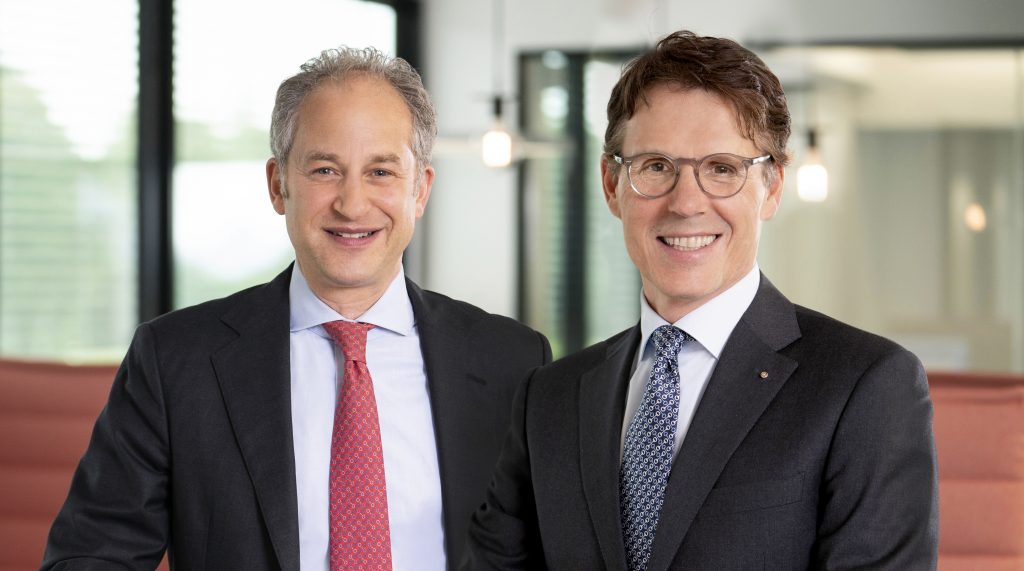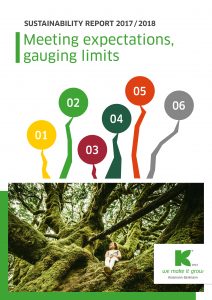Meeting expectations, gauging limits
Klasmann-Deilmann publishes seventh Sustainability Report
An interview with Moritz Böcking and Bernd Wehming
The Klasmann-Deilmann Group has published its seventh Sustainability Report. Subtitled ‘Meeting expectations, gauging limits’, it addresses undeniably conflicting trends. Efforts are being stepped up in pursuing goals linked to high expectations. At the same time, limits to feasibility must be borne in mind. We spoke to our Managing Directors Moritz Böcking and Bernd Wehming about sustainable development within the Klasmann-Deilmann Group.
Dirk Röse: The Klasmann-Deilmann Group issued its seventh Sustainability Report in November 2019. Reports had hitherto been produced annually; this time the interval was two years.
Moritz Böcking: It was good that we published our first reports on an annual basis. During that period, we vigorously pursued our company’s sustainable-development policy and were able to make appreciable improvements from report to report. We have now achieved a very high level of performance in this area, in which we are front-runners both in our industry and in our home region. We have shown how seriously we take this issue. All further developments will take time. So I feel that having biennial reports is appropriate.
Bernd Wehming: The two years since the last Sustainability Report also provided an important opportunity for us to revisit our material sustainability topics in depth. Dialogue with our internal and external stakeholders led to important new ideas arising during this period. And we now have a clearer picture of the direction in which our company’s sustainable development is going, and of what we are seeking to aspire to …
Dirk Röse: … which I’m sure is a reference to the report’s subtitle: ‘Meeting expectations, gauging limits’. Is a balancing of objectives involved, i.e. considering which goals are to be pursued and which are to be dropped?
Bernd Wehming: Exactly. We have viewed, and taken forward, our sustainable development in a very wide sense. But not everything is feasible, nor is everything necessary. What was needed was to prudently weigh up what we want to focus on in future.
Dirk Röse: It’s partly about fulfilling certain expectations.
Moritz Böcking: And for a good reason. In the political landscape – within Europe at least – there are growing signs that the use of peat in commercial horticulture is to be restricted. Therefore, expectations made of us include further progress in producing and using alternative raw materials in our substrates. We are already very close to hitting a key target: namely, to increase the proportion of alternative substrate constituents to 15% by volume of our total annual production by the end of 2020. In conjunction with our strategic plan for the period until 2025, we now aim to achieve a share of 30% by volume. We are doing extremely well in this regard.
Bernd Wehming: At the same time, there remains a lack of suitable alternative constituents that are available – both in the necessary quality, and in the large quantities required if peat use is to be reduced on a global scale or, initially, at least on a European scale.
Moritz Böcking: The future for international commercial horticulture is uncertain in one crucial regard: an elementary function in the growth process of a crop has been ideally served for decades now by peat-based growing media. The task is to provide this function equally reliably using alternative constituents, or to replace it by adopting completely new cultivation methods.
Dirk Röse: How is Klasmann-Deilmann dealing with this challenge? I understand that increasing use is being made of alternative substrate constituents.
Moritz Böcking: The versatility of well-established alternative ingredients such as wood fibre, green compost, coir pith and perlite is continuously being improved by our specialists. We have also further intensified our research activities targeted at developing completely new substrate constituents and growing systems. Our Research & Development division and the Incubator, which has been very active for some years now, are searching – across a sufficiently wide spectrum and with open minds – for new constituents, methods of cultivation and other innovations.
Bernd Wehming: For a business with the character of an SME, the financial and human resources involved are very considerable. We must bear in mind that by no means all research projects yield the hoped-for outcomes. Only rarely, in fact, do research activities lead to marked beneficial effects. Support measures are therefore desirable here for those countries that are stepping up the phase-out of peat use, or indeed at EU level as well. We are submitting proposals to this end via our trade association and in direct dialogue with political representatives.

Managing Directors of Klasmann Deilmann: Moritz Böcking (left) and Bernd Wehming (right)
Dirk Röse: Can you tell me about one successful research project in recent years that has led to genuine advances?
Moritz Böcking: An outstanding example of this is our long-term project involving Sphagnum farming: the deliberate cultivation of peat moss. Its original aim was to develop a substrate constituent that is (in the best sense of the word) sustainable. However, this project initially led to the discovery that, while peat moss is ideally suited as a raw material for substrate production, its cultivation is not at present commercially viable. Excessively high land prices, low productivity, a lack of available means of financial support, inadequate harvesting techniques, etc. – these are all reasons why we are not pursuing this goal any further for the time being. At the same time, the project yielded other positive, if unexpected, results regarding peat moss cultivation specifically for raised-bog development.
Bernd Wehming: It is now clear that the Sphagnum-farming method developed by ourselves and our partners represents a significant advance for the restoration of former extraction areas. We are therefore currently taking forward a related business model that may be instrumental in reducing greenhouse gas emissions from peatlands and in creating living raised bogs.
Dirk Röse: Speaking of greenhouse gases: this is certainly an important issue. The Klasmann-Deilmann Group’s carbon footprint for 2018 is higher than that for 2016.
Moritz Böcking: There were conflicting goals: reduction of emissions on the one hand, and business growth on the other. We have consciously taken this challenge on board.
Bernd Wehming: We are very happy that emissions at product level decreased over the same period: emissions per cubic metre of substrate fell from 59.40 kg in 2016 to 58.73 kg CO2e in 2018. This is chiefly thanks to the increased use of alternative constituents.
Moritz Böcking: It’s always about the product that we pass on to our customers. And our emissions are decreasing at product level because we know precisely how we can manage this trend. That’s why our product carbon footprint will be a key indicator of our sustainable-development performance in future.
Bernd Wehming: We take the emissions caused by our company very seriously. Approximately one third each comes from peat use (31 %) and from worldwide transport (36 %). Added to this are energy consumption (10 %) and purchased materials (23 %). We view this as a priority mission and have explored various scenarios aimed at countering this trend. We have now opted for a model that will allow climate impacts from peat use and transport to be reduced.
Moritz Böcking: Over the next few years we will invest heavily in decentralising our production. We are, with our factories, moving closer to customers in major markets; we will draw on locally available, renewable and sustainable raw materials while at the same time markedly reducing transport distances. Bernd Wehming: This development has been partly driven by further stepping-up of the evaluation of upcoming investments using sustainability criteria.
Dirk Röse: What, then, are the limits to sustainable development?
Moritz Böcking: The measures we have mentioned relate closely to our core business and are, to use a Global Reporting Initiative (GRI) term, ‘material’ to our sustainable development. We have conducted a materiality analysis to reassess what precisely is, and is not, of central importance to us.
Bernd Wehming: This was prompted by the realisation that we were, increasingly, occupied with time-consuming tasks that stretch to the limit the human resources of our company, with its lean organisation, yet without appreciable benefits in terms of sustainable development. In response, we have drawn sharper dividing-lines between issues material to us and those less so or not at all. In future, we will once again be focusing on those areas where the expectations placed on us are greatest, and which unlock sustainable potential.
Moritz Böcking: And these areas are the development of alternative constituents and growing systems, the reduction of emissions from peat production and transport, the rehabilitation of former extraction sites and, of course, the provision of renewable resources for generating renewable energy.
Dirk Röse: This time, the printed version is only half as long as the 2016 report.
Moritz Böcking: It was a conscious decision on our part to produce an abridged edition containing the key facts and figures – a version available both digitally and in printed form. It has been made reader-friendly by dividing the content into brief sections. Readers can dip in and out anywhere, or jump from place to place.
Bernd Wehming: There is also a complete version that is even longer than the 2016 report. The full Sustainability Report is in line with GRI standards, i.e. with globally recognised guidelines. And, in the previous two years, things have also progressed on this front – we now take into account even more guidelines, and our reporting of aspects such as human-resources matters has become more comprehensive.
Moritz Böcking: I think it’s good that we follow the various guidelines, as this places our report at an internationally recognised level. Our focus on our material topics is clearly evident – first and foremost, we report on what is expected of us. The key chapters are those on peat production and on the use of alternative substate constituents, as well as those chapters devoted to the carbon footprint and to site restoration.
Dirk Röse: Thank you for speaking with us.
